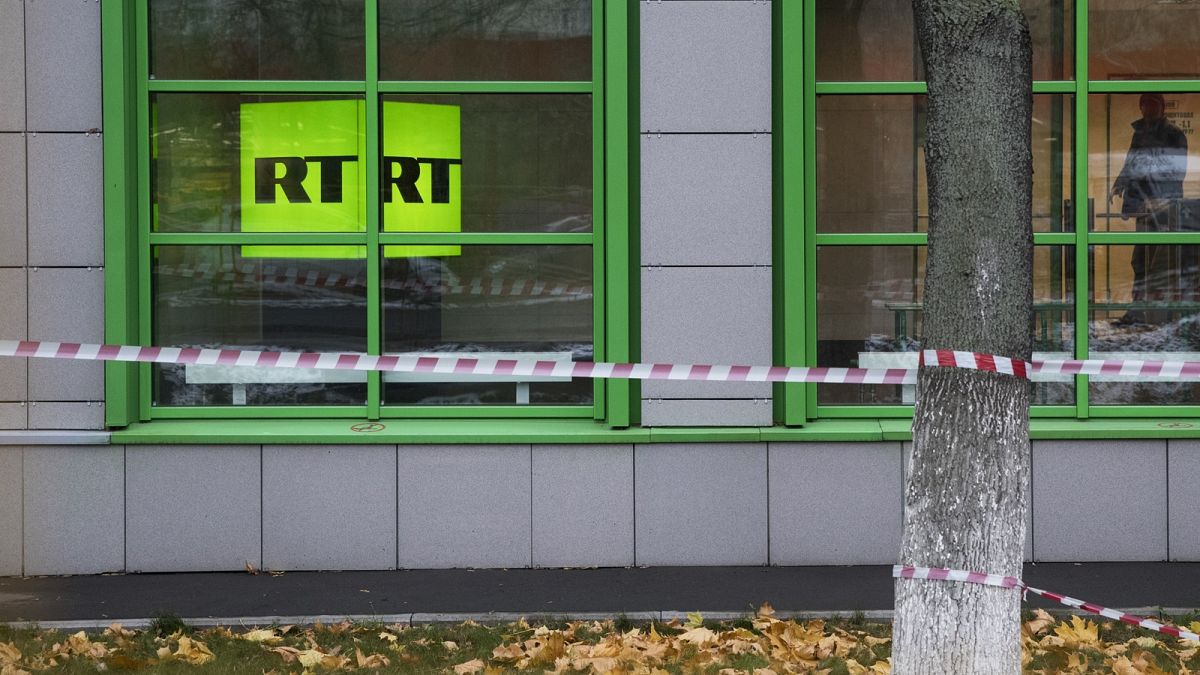The bloc's top court argued the restriction does not infringe media freedom.
The European General Court has upheld a sweeping EU-wide ban on RT, the state-controlled Russian TV channel that has repeatedly been accused of amplifying the Kremlin's political agenda, spreading disinformation campaigns and building support for the invasion of Ukraine.
The judges argued that, given the significant role played by audio-visual media in modern societies, a "large-scale" operation in favour of the war could be legally covered by the EU's sanctions regimes without putting press freedom into question.
They also found that the "exceptional context and extreme urgency" of the war justified the rapid introduction of the restrictive measure and did not infringe RT's right to be heard.
"The General Court finds that the condition that the limitations on the freedom of expression must be laid down by law is satisfied," the judges said in a ruling issued on Wednesday morning.
The court said there was a "concrete, precise and consistent body of evidence" that can demonstrate RT's disinformation campaigns constitute a "significant and direct threat" to the EU's public order and security.
Reacting to the news, Dmitry Peskov, press secretary for President Vladimir Putin, said the ruling was an attack on freedom of speech and that Russia will continue putting pressure on Western media working in the country, according to comments reported by the Interfax news agency.
"We will not let them work in our country, and there will be no soft position here," Peskov said.
The EU suspended the channel's broadcasting licence in early March as part of a broader package of sanctions against Russia over the Ukraine war.
The bloc considers that RT, formerly known as Russia Today, is trying to destabilise the EU, Ukraine and neighbouring countries by distorting facts and making a case in favour of Russia's invasion.
The suspension applies to RT's authorisation, transmission and distribution across the entire territory of all 27 member states through cable, satellite, websites, social media, apps and other multimedia platforms.
It affects five editions: RT English, RT UK, RT Germany, RT France, and RT Spanish.
A similar ban was slapped on Sputnik, the state-owned news agency.
But the sanctions on the news outlets raised multiple concerns over media freedom and censorship, which EU officials vehemently reject.
"There is no place in the EU for manipulation justifying Russia’s war of aggression," said Josep Borrell, the EU's foreign policy chief, welcoming the court's ruling. "Our work towards stronger resilience against foreign information manipulation and interference continues."
Laurence Boone, France's state secretary in charge of European affairs, said the bloc "will not tolerate misinformation: Russia is the aggressor, not the other way around."
Shortly after the sanctions were announced, RT France launched a legal case before the EU's top court in a bid to have the ban lifted. A request for an interim measure was already rejected in March.
On Wednesday, the General Court dismissed each and every accusation levelled by the channel against the bloc, cementing the legality of the prohibition.
"The limitations on RT France’s freedom of expression which the restrictive measures at issue are liable to have are proportionate, inasmuch as they are appropriate and necessary, to the aims pursued," the court said.
Despite the suspension, both RT and Sputnik have found ways to share their content in the EU and remain visible across social media, a report by the Disinformation Situation Centre has found.
Brussels has said the ban would apply until the Ukraine war comes to an end and until the outlets cease to conduct disinformation campaigns.


